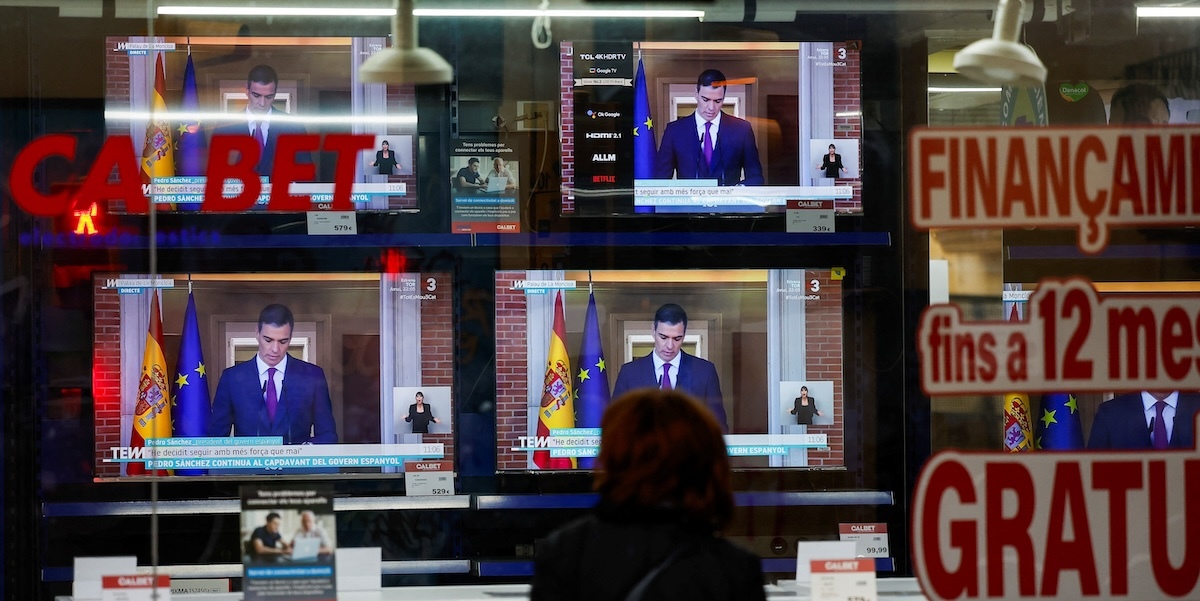Loading player
On Monday morning, Spanish Prime Minister Pedro Sánchez, of the Socialist Workers Party (PSOE), announced that he does not intend to resign and will therefore continue to lead the government. He announced it with a short speech at Moncloa, the seat of the Spanish government: it was a long-awaited decision, given that last Wednesday Sánchez had interrupted institutional activities following the opening of an investigation against his wife, Begoña Gòmez, for a complaint presented by a union close to the far right. Sánchez had then stopped all institutional activities and said that he would evaluate whether to resign.
The investigation for alleged illicit influence trafficking against Gómez was opened after a complaint from Manos Limpias, a far-right “pseudo-syndicate”, known for its closeness to movements nostalgic for Francoism and above all for its frequent complaints against politicians and progressive public figures, almost all false or inconclusive.
Sánchez had said that Manos Limpias’ accusations are part of a broader campaign of discredit against him and his family that has been going on for months and which is supported not only by politically motivated organizations like Manos Limpias, but also by right-wing parties and center-right, such as the Popular Party and Vox. These accusations are often part of the very aggressive rhetoric that Spanish politics has taken on in recent years, but in some cases they have become personal insults.
More generally, in his speech on Monday, Sánchez denounced the very strong polarization of Spanish political life, dominated, according to the prime minister, by personal attacks and the demonization of the opponent: «If we accept as a society that political action allows attacks indiscriminate to innocent people, then it’s not worth it. If we allow clashes between parties to justify the exercise of hatred, snares and falsehoods against third parties, then it is not worth it.”
According to analysts, Sánchez could have resigned and set in motion the mechanism for the formation of a new government, or to go to new elections; alternatively, he could have asked the Spanish parliament for a new vote of confidence, to confirm the solidity of his government. Instead he decided not to do any of this, and to continue his government activities as normal. Sánchez, however, tried to make this moment an important event of the legislature, and said that from now on he will work for the “regeneration” of Spanish democracy, even if he did not explain well what this consists of.
«My wife and I know that this defamatory campaign will not stop. It’s been going on for ten years. It’s serious, but it’s not the most important thing: we can bear it. The point is what kind of society we want to be,” she added.
On Sunday in Madrid there was a large demonstration in support of Sánchez, which was attended by thousands of people: in the speech given on Monday the prime minister said that he had decided not to resign also thanks to the demonstrations of support received in recent days from the of many citizens.
– Read also: The far-right “pseudo-syndicate” that denounced Pedro Sánchez’s wife in Spain
Over the last week there had been great agitation in Spanish politics, waiting to know Sánchez’s decision and the future of his government. It is already a complicated period in itself, in which electoral campaigns are underway both for the elections to the Catalan parliament on May 12th and for the European elections on June 9th. The PSOE on Friday he should have approved definitively the lists of its candidates for the European elections, but has decided to postpone everything until tomorrow.
Sánchez is 52 years old, has been in office since 2018 and the current one is the third government of which he is prime minister. He took office in November 2023, after long negotiations with the autonomist and independence parties of various Spanish regions. However, it is a minority government, that is, supported by a number of members of parliament that does not exceed half of the total.
